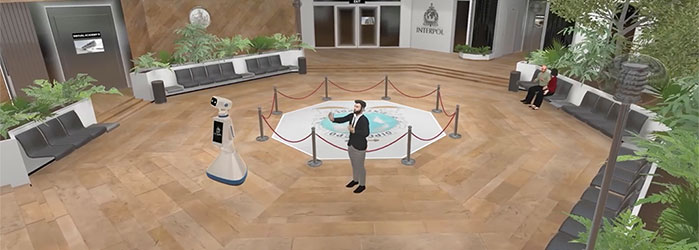INTERPOL unveiled the first-ever Metaverse specifically designed for law enforcement agencies around the world during a surprise session of the 90th General Assembly held in New Delhi.
Virtual Hands Up?
A virtual facsimile of the INTERPOL Headquarters in Lyon, France, which is fully operational, can be toured by registered users using the INTERPOL Metaverse, regardless of where they are geographically or physically located.
It is also possible to interact with other officers via avatars as well as to enroll in immersive training courses related to forensic investigation and other police skills.
Often, the Metaverse is considered not to be simply a gadget to entertain gamers but rather an innovative stage in the development of the Internet that could be the next step forward.
A recent report from technology research firm Gartner, which predicts the usage of the Metaverse for work, study, shopping, and socializing will be at least an hour a day by 2026, claims one in every four people.
There are already criminals who are taking advantage of the Metaverse. There is no doubt that social engineering scams, as well as violent extremism and misinformation, will pose key challenges. This is in light of WEF’s partnership with INTERPOL, Meta, and Microsoft in an initiative to define and govern the Metaverse.
With the growth of Metaverse users and further development of technology, the possibilities of crimes will only increase as the number of Metaverse users continues to grow. This includes crimes against children, data theft, money laundering, financial fraud, counterfeiting, ransomware, phishing, sexual harassment, and financial fraud.
Obviously, there are a number of challenges that are likely to arise for law enforcement since not every act that is criminalized in the physical world is considered a crime in the virtual world, and this is a significant threat to law enforcement.
For law enforcement, the Metaverse holds many advantages, including the ability to work remotely, the ability to network with other agencies, the ability to collect and preserve evidence at crime scenes, and the ability to carry out training in the Metaverse.
Investing in the development of student capacity within the Metaverse has the potential to be particularly valuable, offering students the chance to collaborate and network, ensuring increased engagement through immersion, and enabling hands-on learning opportunities.
The Metaverse Classroom was used to demonstrate INTERPOL’s capabilities for travel document verification and passenger screening using a live demonstration of a training course that was delivered by experts from the INTERPOL Capacity Building and Training Directorate.
At the virtual border point, the students were able to put into practice their newly-acquired skills as they were teleported to an airport where they could exercise their new skills.











